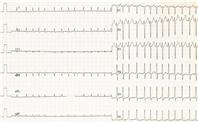This paper appears to say, if you start to get atrial fibrillation, then you are around three times more likely than the general population to be diagnosed as hyperthyroid within 13 years.
Obviously, this would not include people already diagnosed hyperthyroid!
And I can't help wondering what percentage of those same people developed hypothyroidism over the same period? Especially given the frequency with which people suffering Hashimoto's appear to have periods of elevated FT3 (at least). Need to read the whole paper, I guess!
It would be interesting to hear from anyone who had afib diagnosed before hyperthyroidism. After all, this is being talked about as a predictor.
PLoS One. 2013;8(2):e57893. doi: 10.1371/journal.pone.0057893. Epub 2013 Feb 28.
New-onset atrial fibrillation is a predictor of subsequent hyperthyroidism: a nationwide cohort study.
Selmer C, Hansen ML, Olesen JB, Mérie C, Lindhardsen J, Olsen AM, Madsen JC, Schmidt U, Faber J, Hansen PR, Pedersen OD, Torp-Pedersen C, Gislason GH.
Source
Department of Cardiology, Gentofte University Hospital, Hellerup, Denmark.
Abstract
AIMS:
To examine the long-term risk of hyperthyroidism in patients admitted to hospital with new-onset AF. Hyperthyroidism is a well-known risk factor for atrial fibrillation (AF), but it is unknown whether new-onset AF predicts later-occurring hyperthyroidism.
METHODS AND RESULTS:
All patients admitted with new-onset AF in Denmark from 1997-2009, and their present and subsequent use of anti-thyroid medication was identified by individual-level linkage of nationwide registries. Patients with previous thyroid diagnosis or thyroid medication use were excluded. Development of hyperthyroidism was assessed as initiation of methimazole or propylthiouracil up to a 13-year period. Risk of hyperthyroidism was analysed by Poisson regression models adjusted for important confounders such as amiodarone treatment. Non-AF individuals from the general population served as reference. A total of 145,623 patients with new-onset AF were included (mean age 66.4 years [SD ±13.2] and 55.3% males) of whom 3% (4,620 events; 62.2% women) developed hyperthyroidism in the post-hospitalization period compared to 1% (48,609 events; 82% women) in the general population (n?=?3,866,889). In both women and men we found a significantly increased risk of hyperthyroidism associated with new-onset AF compared to individuals in the general population. The highest risk was found in middle-aged men and was consistently increased throughout the 13-year period of observation. The results were confirmed in a substudy analysis of 527,352 patients who had thyroid screening done.
CONCLUSION:
New-onset AF seems to be a predictor of hyperthyroidism. Increased focus on subsequent risk of hyperthyroidism in patients with new-onset AF is warranted.
PMID: 23469097 [PubMed - in process]
ncbi.nlm.nih.gov/pubmed/234...
Full paper freely accessible from here:
plosone.org/article/info%3A...
Rod
Picture shows ECG with atrial fibrillation

